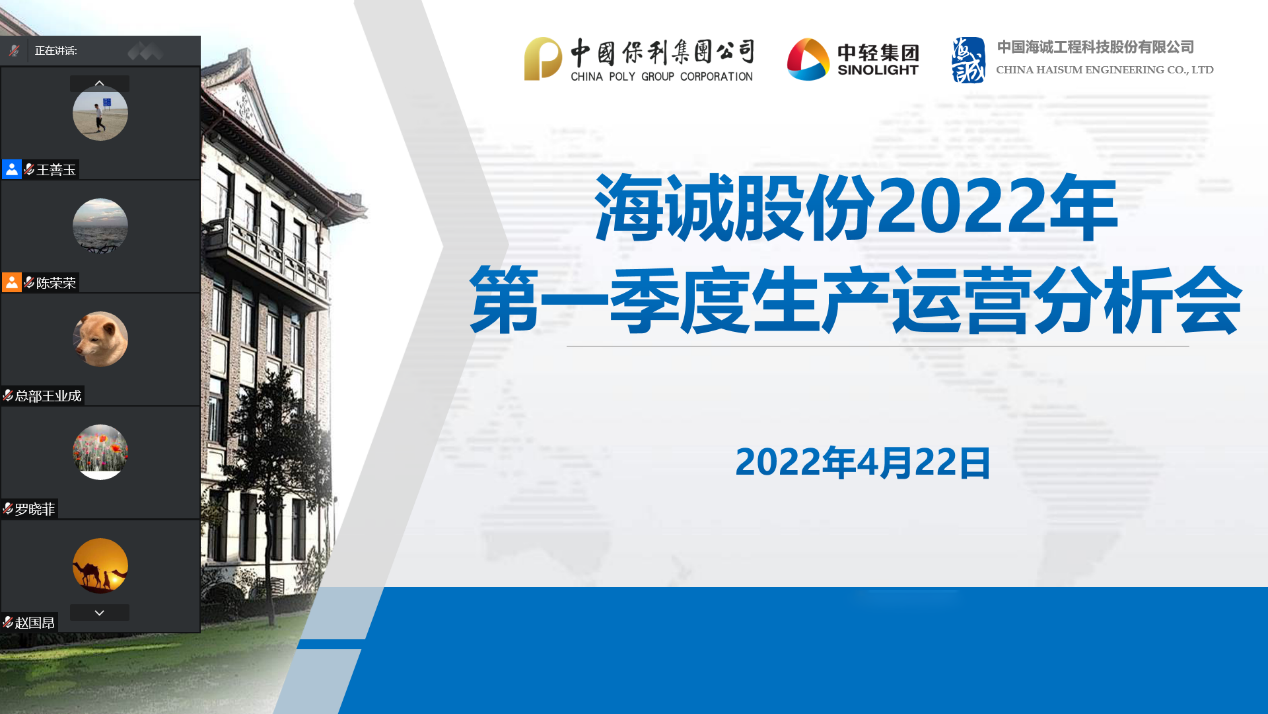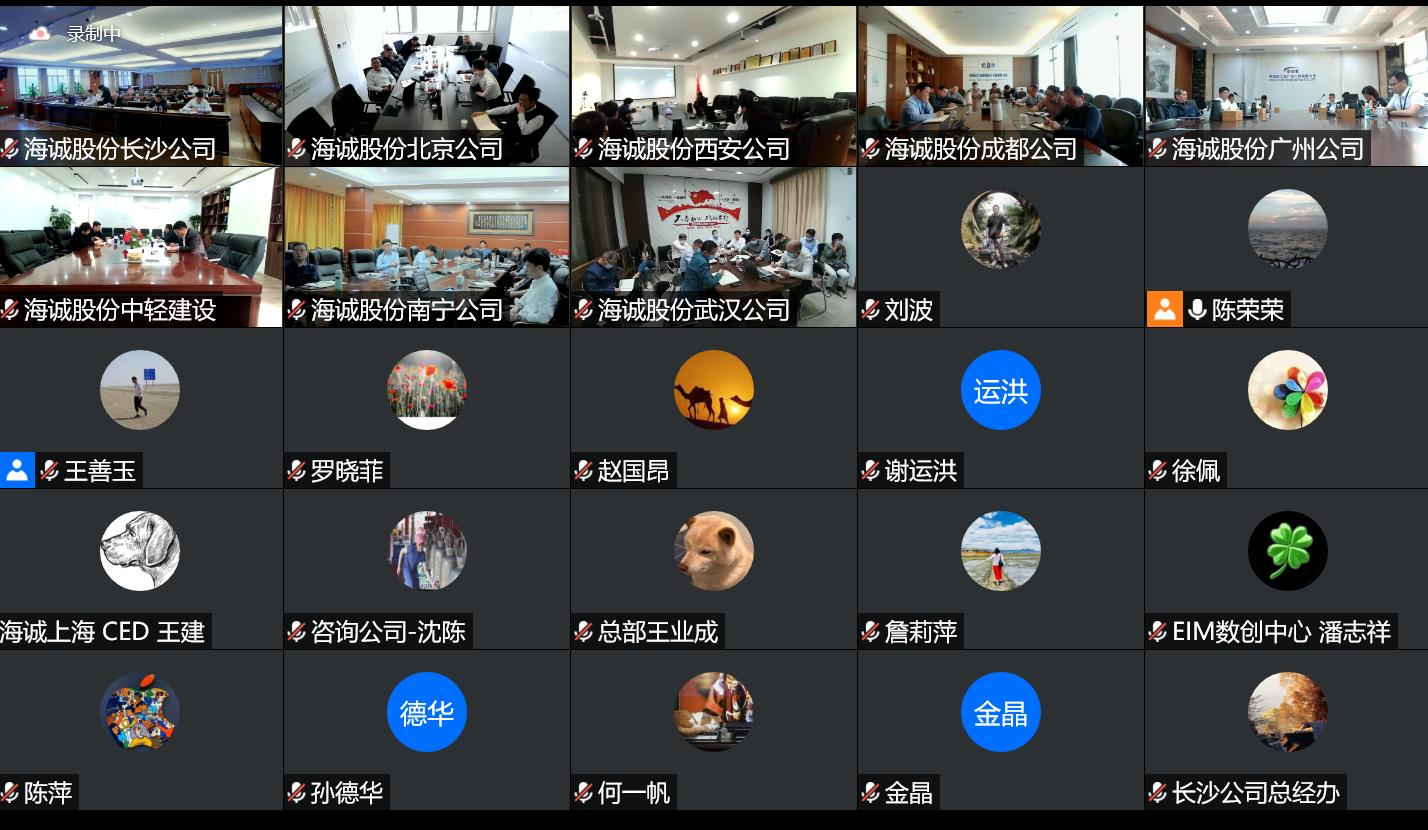
On April 22, China Haisum held the production and operation analysis meeting in the first quarter of 2022 in the form of videoconferencing to thoroughly implement the decision-making and deployment of the symposium convened by Poly Sinolight in the first quarter of 2022, comprehensively summarize the work of the first quarter, and study and deploy key tasks in the next stage. Zhao Guoang, Secretary of the CPC Committee and Chairman of Haisum, attended the meeting via video and delivered a speech. Chen Rongrong, Deputy Secretary of the CPC Committee and President of Haisum, presided over the symposium. The leaders of the Company, the department heads of the headquarters, the leaders of the the Shanghai Business Developments and subsidiaries, and the related personnel from finance, digitalization, production and operation departments attended the meeting at branch venues.
At the symposium, the Strategic Operation Center made a work report on three aspects: Production and operation in the first quarter of 2022, the overall operation and trend comparison in 2021, and the progress and plan of lean management. The heads of 11 business units communicated with each other and summarized the implementation of the plans, the results of production and operation in the first quarter, the progress of major work, and the core work of the next step focusing on "the year of party building & improvement", "innovation", "lean management" and "implementation". respectively.
Lin Lin, Chief Financial Officer and Secretary of the Board of Directors of Haisum, and Du Daoyou, Vice President of Haisum, as well as the Market Development Center, Human Resource Management Center, EIM Digital Innovation Center, Technology R&D Center, and Cost & Contract Center made special speeches respectively.

At the symposium, Chen Rongrong, Deputy Secretary of the CPC Committee and President of Haisum, delivered a speech. He said that the symposium has a wide range of high-quality exchanges and topics, but the key lies in the follow-up specific implementation, which requires everyone to work hard to solve the problems together. Chen Rongrong shared three thoughts:
First, COVID-19 is like a reflector, providing us with an opportunity to re-acquaint ourselves. We should not waste any opportunity in crisis, and re-examine ourselves with a positive attitude to think about how to deal with the crisis and improve our "immunity".
Second, we need to abandon conventional thinking and old habits and move forward through continuous trials and errors to find new with the old. All subsidiaries should actively explore innovations in management modes and stick to constructing cloud platforms to reduce dependence on office space and seek new breakthroughs.
Third, we need to use project thinking to find problems, think about problems, solve problems, and redefine problems. The hardest of practicing lean management is that we cannot find problems. On the basis of finding problems and clarifying the direction, we should solidify the concept of lean management into the system through a standardized and standardized management mode to guide and standardize employees and improve efficiency.
Chen Rongrong required all departments, the headquarters and subsidiaries to take a comprehensive and in-depth examination of the changes in the environment and their own business logic to improve internal skills and build core competitiveness; all subsidiaries should seriously consider the "Blue Ocean Strategy" in the "Red Ocean Market", cultivate new momentum for development through digital transformation and upgrading, and foster new development with new momentum; and it is necessary to find a path for digital transformation and upgrading on the basis of making full use of data to expand the space for innovation and development. In an uncertain environment, it is important to "persist in doing the hard but right things" to create competitive advantages for the enterprise.
At the end of the symposium, Zhao Guoang, Secretary of the CPC Committee and Chairman of the Board of Directors, made a summary speech. On behalf of the Communist Party Committee of the Company, he expressed condolences and gratitude to all Haisum colleagues who stuck to their posts and persisted in their work during COVID-19. He also analyzed the current situation faced by the company from three aspects: understanding the environment, understanding ourselves and implementing actions, and emphasized the requirements for future response measures.
Zhao Guoang pointed out that overseas business is affected by COVID-19 and changes in the international political and economic situation and cannot be recovered in the short term. In addition, the domestic business is facing severe challenges such as economic downward and ensuring growth of the group, but there are new opportunities in policies and markets. Each unit should make a comprehensive analysis from the perspectives of resources, capabilities, organization, mechanism, main business and existing problems to confirm its own advantages and disadvantages and make mental preparations to deal with difficulties and "fight a protracted war".
In terms of resources, it is necessary to analyze how to deal with challenges and how to digitally transform from five aspects of manpower, technology, qualification, capital and brand. In terms of capabilities, it is necessary to analyze five capabilities, including market expansion capability, operational management capability, technological innovation capability, capital operation capability and risk management capability. In terms of organization, it is necessary to firmly focus on the positioning of an "engineering company" and the promotion of organizational reform. In terms of mechanism, it is necessary to focus on the project manager's responsibility system management method, dynamic management of the whole process and total cost, refined cost, real profit, strict assessment and certain fulfillment, which should be realized with digitalization development. In terms of the main business, it is necessary to consider whether the development direction of the main business is clear? How competitive are the business models, profit models, and operating models? How to cultivate the second and the third main businesses? Are there key products with competitive advantages in the market?
Zhao Guoang stressed that all units should attach great importance to organizational reform, digital transformation, new business cultivation, business collaboration, internal development differentiation and other issues that plague enterprise development, and carry out the work in the next stage from the following four aspects:
The first is to create its own sustainable irreplaceability. Specifically, it is necessary to build core competitiveness and become irreplaceable in terms of technology, management and business model.
The second is to create industry groups and innovate collaborative models. It is important to establish collaborative symbiosis with brother units in Haisum, namely, collaboration in the state of internal openness, and symbiosis in the state of all-round openness.
The third is to organize learning in a planned way. The Company needs to adapt to the new technological environment and increase dynamic adaptability. The learning speed must be faster than the changing rate of the external environment. The core of learning organization is to enhance organizational knowledge creation and production capabilities.
The fourth is to study how to carry out normal operations against the abnormal background that COVID-19 is "difficult to eradicate".
Zhao Guoang emphasized that despite the difficulties encountered in the epidemic, the goals and confidence in completing the tasks this year remain unchanged. In the era of regular COVID-19 prevention and control, we must confront the challenges, embrace opportunities and redouble our efforts to fully complete the annual tasks of production, operation, reform and development, so that we can present a tribute to the success of the 20th National Congress of the Communist Party of China.
At the symposium, Zhao Guoang also emphasized the specific requirements for production safety. Finally, the leaders of the Company made respective comments and put forward specific requirements based on the subsidiaries in charge and the business in charge.